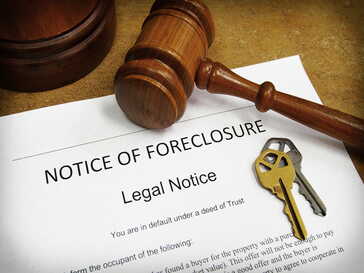
According to data provided by the Federal Deposit Insurance Corporation (FDIC), approximately 250,000 foreclosures are initiated in the United States each year.
For a homeowner, dealing with a foreclosure, or the possibility of foreclosure, can be deeply stressful, even traumatic.
If you or your loved one is facing foreclosure in Texas, it is crucial that you have a basic understanding of relevant state and federal regulations.
Here, our Dallas wrongful foreclosure lawyer provides an overview of the most important things that you need to know about the foreclosure laws in Texas.
An Overview of Texas Foreclosure Laws
Most Mortgages in Texas Have a Grace Period
If you miss a single mortgage payment by a few days, it is not the end of the world — far from it.
Most mortgages in Texas have a grace period, typically one that is between ten days and fifteen days.
When possible, it is critical that you make your mortgage payments on time.
Though, you should also familiarize yourself with the grace period that applies to your specific mortgage, so that you know if you are being charged an unfair late payment fee.
Federal Law Generally Requires Lenders To Take Action During the Pre-Foreclosure Period
For most mortgages, federal law (12 CFR § 1024.39) requires lenders to take certain actions during the pre-foreclosure period. The pre-foreclosure period is defined as the timeframe between when a payment was missed and the time when a foreclosure is actually initiated by the lender.
During this period, mortgage lenders generally have a duty to follow certain early intervention requirements.
More specifically, lenders should call the borrower and send a written notification letter. If you are having trouble making your mortgage payments, you should take action during the pre-foreclosure period. Y
ou may be able to get a loan modification or some form of forbearance from your lender. Ignoring phone calls and letters from your lender will only create more problems.
No Right of Redemption Under Texas Foreclosure Law
One of the most important things that homeowners in Texas need to know about the state’s foreclosure laws is that there is no right of redemption.
A right of redemption, which exists in some jurisdictions, give homeowners the right to repurchase a property for the same price that it was sold at in a foreclosure auction.
As there is no general statutory right of redemption in Texas, borrowers have little to no opportunity to redeem a home once it has been sold in foreclosure.
Texas Law Allows For Non Judicial Foreclosure
In Texas, the overwhelming majority of foreclosures are non judicial foreclosures. Most mortgage agreements in the state contain a ‘power of sale’ clause, which grants a lender the right to foreclose on the property by itself — without taking the borrower to court.
Unfortunately for homeowners in Texas, non judicial foreclosures typically proceed far more quickly than do judicial foreclosures.
In fact, most non judicial foreclosures are completed within a few months, whereas judicial foreclosures can take more than a year.
For this reason, financially distressed homeowners need to take immediate action to protect their rights. If you are falling behind on your mortgage or you have received a foreclosure notice, you should contact an experienced attorney right away.
Following Foreclosure, a Lender May Seek a Deficiency Judgment
With some limited exceptions, foreclosure sales typically do not satisfy the full amount of the defaulted mortgage. As a result, lenders may attempt to take additional action to hold the foreclosed-upon borrower personally liable for the remaining amount.
This is done through a type of legal claim called a deficiency judgment or deficiency action. Facing a deficiency judgment after already being foreclosed upon can be devastating.
If you find yourself facing a potential deficiency judgment, you need to know how to explore all of your available legal options.
You may be entitled to an offset in the deficiency when accounting for the fair market value of the property that was foreclosed on. A Texas wrongful foreclosure attorney can protect you protect your legal rights.
Get Help From our Texas Wrongful Foreclosure Attorney Today
At Khirallah PLLC, our Texas wrongful foreclosure lawyer is committed to providing effective, personalized legal representation to homeowners. If you or your loved one is facing a wrongful foreclosure or has already been wrongfully foreclosed on, we are here to help.
To set up a free, fully confidential review of your wrongful foreclosure case, please do not hesitate to contact our Dallas law office today.




